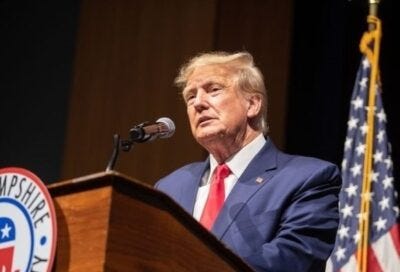Republican Loyalty Pledge: Should Trump Agree?
There are good reasons for the former president to opt in - or out.
Donald Trump (Photo by Scott Eisen/Getty Images)
And so the deed is done. Republican Party Chair Ronna McDaniel has announced that a loyalty pledge to the party’s ultimate 2024 presidential nominee will almost certainly be required of all candidates in order to be included in GOP-sponsored primary debates set to commence in August. “I think it’s kind of a no-brainer, right? If you’re going to be on the Republican National Committee debate stage asking voters to support you, you should say, ‘I’m going to support the voters and who they choose as the nominee,'” McDaniel told CNN on Sunday.
At the most basic level, it is not difficult to figure out the reason for such a decision – party unity – but also at whom it is aimed. Donald Trump famously refused to commit to supporting any nominee other than himself in 2016. And while the issue became moot when Trump ran roughshod over the rest of the candidates, it represented a looming sword of Damocles hanging over the party that has presented a quandary once more as Trump attempts to recover his former glory with a third – and presumably final – run for the big prize.
Indeed, things are very different seven years later in 2023, with much clean and polluted water under the dam, so Trump may now need the party more than the party needs him. A recent survey revealed that 50% of self-proclaimed Republicans are looking elsewhere for their next standard-bearer (at the same time, 60% of Democrats don’t want Biden, so it’s all relative).
Thus, the question becomes whether Trump, as a bow to present reality, views such a pledge as necessary or decides he need not do so and refuses to offer blind support in advance for a TBD nominee. None of the other candidates are likely to refuse the pledge, but Trump already stated in a recent interview – before the McDaniel edict – that his support would be conditional. “It would depend,” Mr. Trump told radio host Hugh Hewitt. “It would have to depend on who the nominee was.” Will he change his mind now on a crucial decision that is no longer theoretical? Will he go along to get along? Or will he stand his ground and refuse, preferring – or at least willing – to stand apart from a multi-candidate field with superior stature as the only one who has already performed the job in question?
Trump and the Loyalty Pledge: Damned if You Do – Or Don’t
There is good reason for Trump to say yes to the pledge, but also good reason to say no. While the likes of Ron DeSantis and Mike Pompeo hold worldviews similar to Trump, there are as many as a dozen Republicans who have expressed some level of interest in a presidential run, and a few – most prominently New Hampshire Gov. Chris Sununu and former Maryland Gov. Larry Hogan – are Trump critics, if not outright Never-Trumpers. Then there are others, including Trump UN Ambassador Nikki Haley, who threw her hat in the ring recently, plus Trump’s VP Mike Pence and Secretary of State Mike Pompeo, who come out of the Trump administration but have since, for varying reasons, established relative independence from the Trump brand.
In explaining additional requirements for participation such as a minimum percentage in accredited polls, McDaniel made clear the bar will be high enough to allow the party “to make sure you have people on the debate stage who are running for president. We don’t want people who are running for book deals, or media contracts, or Cabinet positions.”
That can plausibly be said of almost every potential candidate likely to run – with the striking exception of former President Donald Trump. But once the GOP makes the loyalty pledge edict official, should he agree to endorse a candidate he finds wanting at best, or who stands as an outspoken opponent of him at worst? His answer will reveal much about how the Trump whom Republicans have come to know – and mostly love – feels about his own chances of reclaiming his perch in the Oval Office.




